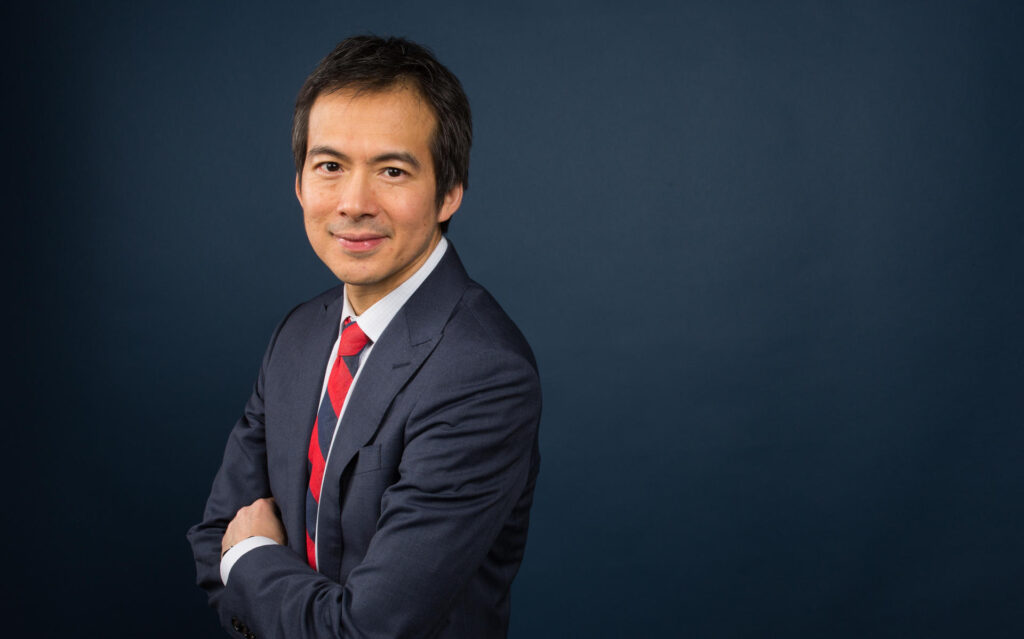
Podcast
Inside Trump’s White House
White House reporter Annie Linskey offers a closer look at how the Trump White House makes decisions and what recent actions reveal about its strategy.
Feature
Archon Fung on the threats to American democracy and what we can do about it.
With democracy on the brink, Professor Archon Fung, director of the Ash Center for Democratic Governance and Innovation, offered attendees at a Harvard Kennedy School event a peek at what lies just over the edge. Leading a discussion on threats to American democracy, Fung provided a diagnosis for democracy’s ailments and laid out a treatment plan to restore the health of our democratic institutions.
The following excerpts, edited for clarity and length, are taken from Fung’s remarks.
I want to submit to you that democracy is far from a normal condition, it’s actually a miracle. And it’s a miracle because it requires two things. One, all of the societies that we live in are plural in the sense that we have deep, deep disagreements about who God is, about whether women have a right to choose, about whether guns should be freely available or highly restricted, about whether climate change demands action right now or if in the fullness of time, enough technological innovation will get us there and solve the problem, so chill out. These are some dimensions of plural society that characterize every society, and certainly every democratic society. That’s what pluralism means. And democracy requires, in the circumstances of pluralism, that losers accept losing. And that’s really hard.
That’s what it means to live in a fragile democracy. The institutions, and the compass points that we used to rely on to tell us what counts as a democratic outcome — we cannot rely upon anymore. Institutional certainty, the judiciary, the popular vote…these things should go in the same direction [but they don’t].
A successful democracy requires that many more people care about the process rather than the substance. And one fundamental reason why our democracy is so fragile right now is that more and more, Americans really feel like winning is existential. And this is true among many, many sides of the spectrum. When you feel that winning is existential, you think substance is more important than the process.

For most of my political memory, the difference between the Democrats and the Republicans was the difference between French vanilla and vanilla ice cream. And when political scientists like to try to figure out why a lot of people don’t vote, one of the things that they discovered was that many people just honestly couldn’t tell the difference.
And so, in that period of narrow aperture politics, the center-left and the center-right agree on many things on the desirability of globalization and free trade, on liberal democracy, on welfare reform and a fairly constrained welfare state, on relatively unconstrained markets, on a certain view of racial meritocratic inclusion. Margaret Thatcher summed up this view in her phrase, “TINA, there is no alternative.”
But from 2015 and 2016 on, it is not a narrow aperture politics, it’s really, really wide. You have MAGA and Brexit on one hand, social movements versus a strong executive, proposals for the universal basic income, proposals to build a wall that’s like the Great Wall of China… People really have very different policy positions.
If you think of democracy as a patient, this is my biological metaphor, there are three things happening to the patient right now: There’s a heart attack, there are chronic challenges, and there are systemic challenges.
The heart attack is January 6th.
At the chronic level, some of the problems are voter suppression, gerrymandering, low voter participation, corruption, and conflict of interest.
And then finally, systemic challenges like spatial and political polarization, unresponsive government, dysfunctional media environment—I would put in there the two-party system and our minority rule institutions and other antiquated institutions. Our Constitution now is about 250 years old. You wouldn’t drive a 250-year-old car? It needs a little bit of a tune-up, right?
Even if we do take care of the heart attack [January 6th], American democracy would still have more heart attacks and would still be very fragile unless we address challenges at the chronic and systemic levels.
Podcast
White House reporter Annie Linskey offers a closer look at how the Trump White House makes decisions and what recent actions reveal about its strategy.
Podcast
Jonathan Rauch joins the podcast to discuss why he now believes “fascism” accurately describes Trump’s governing style.
Podcast
Drawing on new data from more than 10,000 Trump voters, this episode of Terms of Engagement unpacks the diverse constituencies behind the MAGA label.
Podcast
White House reporter Annie Linskey offers a closer look at how the Trump White House makes decisions and what recent actions reveal about its strategy.
Additional Resource
In a new essay, The Case for Building an AmeriCorps Alumni Leadership Network, Allen Lab Policy Fellow Sonali Nijhawan argues that the 1.4 million Americans who have completed national service represent an underleveraged civic asset. Drawing on her experience as former Director of AmeriCorps, Nijhawan outlines a roadmap for transforming dispersed alumni into a connected leadership network capable of reinvigorating public service, rebuilding trust in government, and strengthening civic participation.
Article
Economists and policy analysts broadly agree that more housing needs to be built in order to reduce costs in America’s most expensive cities. Using a novel survey of mayors of mid-sized and large cities to explore mayors’ views on the roots of America’s housing crisis and what solutions they believe will most effectively address their constituents’ housing challenges, the authors summarize mayors’ attitudes and perceptions on key issues related to expanding the housing supply, reporting how well these views correlate with mayors’ assessments of their own cities’ supply needs.

